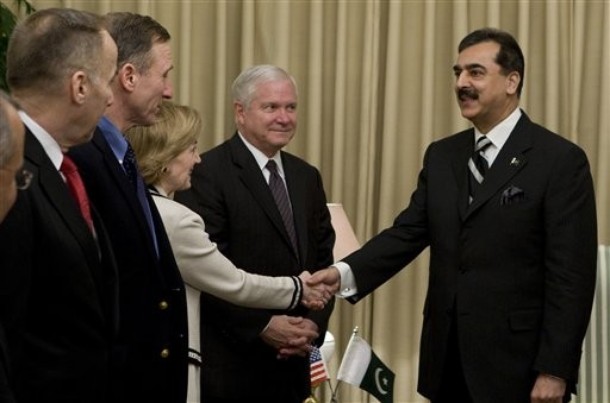
On Dec. 30, an al Qaeda terrorist walked into a CIA base in the Afghan city of Khost and blew himself up, killing 7 CIA agents and a member of Jordan's intelligence service. Shortly thereafter, the perpetraitor of the attack was shown in a video with the leader of the Pakistani Taliban, Hakimullah Mehsud.
It looks like the CIA is pissed:
Since the suicide bombing that took the lives of seven Americans in Afghanistan on Dec. 30, the Central Intelligence Agency has struck back against militants in Pakistan with the most intensive series of missile strikes from drone aircraft since the covert program began.
Beginning the day after the attack on a C.I.A. base in Khost, Afghanistan, the agency has carried out 11 strikes that have killed about 90 people suspected of being militants, according to Pakistani news reports, which make almost no mention of civilian casualties. The assault has included strikes on a mud fortress in North Waziristan on Jan. 6 that killed 17 people and a volley of missiles on a compound in South Waziristan last Sunday that killed at least 20.
Personally, if you're going to wage a war on terrorism, drone attacks seem preferable to nation building. Even if we rebuilt Afghanistan, we've seen clearly al Qaeda's capacity to reconstitute itself in another country (Yemen) and actually launch a (thankfully failed) attack on the U.S. On the whole, a limited use of drone attacks against high-level al Qaeda targets seems a viable alternative to decades-long state building. Still, the drone strikes are not without risk, especially since they range a lot further than high-level al Qaeda terrorists:
If the United States expands the drone strikes beyond the lawless tribal areas to neighboring Baluchistan, as is under discussion, the backlash â??might even spark a social revolution in Pakistan,â? Mr. Arquilla said.So far the reaction in Pakistan to the increased drone strikes has been muted. Last week, Prime Minister Yousaf Raza Gilani of Pakistan told Richard C. Holbrooke, the administrationâ??s senior diplomat for Afghanistan and Pakistan, that the drones undermined the larger war effort. But the issue was not at the top of the agenda as it was a year ago.
Hasan Askari Rizvi, a military analyst in Lahore, said public opposition had been declining because the campaign was viewed as a success. Yet one Pakistani general, who supports the drone strikes as a tactic for keeping militants off balance, questioned the long-term impact.
â??Has the situation stabilized in the past two years?â? asked the general, speaking on condition of anonymity. â??Are the tribal areas more stable?â? Yes, he said, Baitullah Mehsud, founder of the Pakistani Taliban, was killed by a missile last August. â??But heâ??s been replaced and the number of fighters is increasing,â? the general said.
The number of terrorist attacks inside Pakistan have increased too, with the Taliban taking the fight into the heart of Pakistan. Drone strikes are intended to cripple al Qaeda, but if they cripple the Pakistani state along the way and precipitate some kind of collapse of the government, that could potentially be a far worse situation than a low level guerrilla war against the Karzia government in Afghanistan.
It doesn't appear to be the case the Zardari government is collapsing under the weight of drone strikes (corruption is another story). But it's clear they're unhappy, as this Times story recounting Secretary Gates' recent trip makes clear.
(AP Photo)











